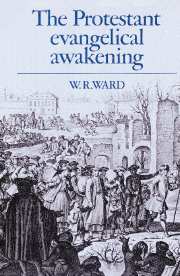Book contents
- Frontmatter
- Contents
- List of maps
- Preface
- List of abbreviations
- 1 The Protestant frame of mind in the eighteenth century
- 2 The beginnings of revival: Silesia and its neighbours
- 3 Salzburg and Austria
- 4 Zinzendorf and the Moravians
- 5 Revival in the South-West of the Empire and Switzerland
- 6 Revival in the North-West of the Empire and the Lower Rhine
- 7 Revival in the American colonies
- 8 Revival in the United Kingdom
- Conclusion
- Index
Conclusion
Published online by Cambridge University Press: 17 March 2010
- Frontmatter
- Contents
- List of maps
- Preface
- List of abbreviations
- 1 The Protestant frame of mind in the eighteenth century
- 2 The beginnings of revival: Silesia and its neighbours
- 3 Salzburg and Austria
- 4 Zinzendorf and the Moravians
- 5 Revival in the South-West of the Empire and Switzerland
- 6 Revival in the North-West of the Empire and the Lower Rhine
- 7 Revival in the American colonies
- 8 Revival in the United Kingdom
- Conclusion
- Index
Summary
To assess the effects of the Great Awakening would require a further and much longer volume than the present attempt to explain its origins. Almost everywhere the revival began in resistance to a real or perceived threat of assimilation by the state in its modern shape, and the timetable of the revival, even in the West, was set by the timetable of the Protestant crisis in Eastern and Central Europe where that threat was most raw and crude. ‘Awakened’ religion had little direct success against the New Leviathan, but Joseph II's Toleration Patent (1781) was a monument to the lesson learned by the Leviathan to proceed, not generously, but more slowly and gently. Equally the religious agents of Habsburg policy had little success in recatholicising areas where Protestantism was forcibly broken; it took another and much later live religion, that of socialism, to succeed here.
As revival moved westwards its nature gradually changed. What had begun as an effort to revive the smouldering embers of religious faith in the absence of the ordinary ecclesiastical mechanisms, and had impressively demonstrated the real force of that Cinderella of Protestant doctrines, the priesthood of all believers, was increasingly taken over by the clergy as a device for solving intractable pastoral problems. Their enterprise was warranted by the evident power of revival in breaking the old paganism of the Baltic lands and the antique mixtures of old forms of Christianity with popular paganisms in the highlands of Wales, Scotland and Bern.
- Type
- Chapter
- Information
- The Protestant Evangelical Awakening , pp. 353 - 355Publisher: Cambridge University PressPrint publication year: 1992



